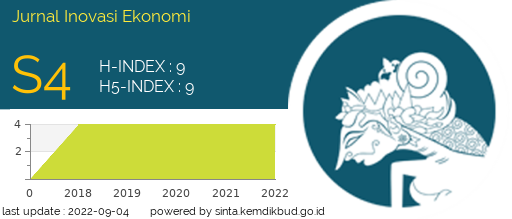Pertumbuhan Ekonomi, Upah Minimum dan Tingkat Pengangguran di Kalimantan Barat
DOI:
https://doi.org/10.22219/jiko.v3i02.7167Abstract
Tujuan artikel ini adalah untuk menganalisis karakteristik dan pengaruh pertumbuhan ekonomi dan kenaikan upah minimum terhadap pengangguran di Kalimantan Barat. Penelitian ini merupakan penelitian deskriptif dengan pendekatan kualitatif-kuantitatif, yakni menggunakan metode analisis statistik deskriptif dan menggunakan analisis regresi data panel. Selama kurun waktu 2011-2015 pengangguran di Kalimantan Barat menunjukkan tren kenaikan, hal ini bersamaan dengan tren pertumbuhan ekonomi yang terus mengalami perlambatan dan kecenderungan upah minimum yang terus mengalami kenaikan. Mayoritas sektor ekonomi yang masih betumpu pada sektor pertanian dan pertambangan adalah salah satu penyebab minimnya lapangan pekerjaan, selain itu, laju inflasi tahunan yang cukup tinggi juga menyebabkan upah minimum di Kalimantan Barat selalu mengalami kenaikan yang cukup signifikan.Downloads
References
Al-Habees, M. A., & Rumman, M. A. (2012). The relationship between unemployment and economic growth in Jordan and some Arab countries. World Applied Sciences Journal. https://doi.org/10.5829/idosiwasj.2012.18.06.2735
Alvarado, R., Iñiguez, M., & Ponce, P. (2017). Foreign direct investment and economic growth in Latin America. Economic Analysis and Policy. https://doi.org/10.1016/j.eap.2017.09.006
Azman-Saini, W. N. W., Baharumshah, A. Z., & Law, S. H. (2010). Foreign direct investment, economic freedom and economic growth: International evidence. Economic Modelling. https://doi.org/10.1016/j.econmod.2010.04.001
BPS. (2018). Tingkat Pengangguran Terbuka Menurut Propinsi 1986-2018. Retrieved from https://www.bps.go.id/statictable/2014/09/15/981/tingkat-pengangguran-terbuka-tpt-menurut-provinsi-1986---2018.html
Cahuc, P., & Michel, P. (1996). Minimum wage unemployment and growth. European Economic Review. https://doi.org/10.1016/0014-2921(95)00035-6
Chong-Uk Kim, G. L. (2018). Minimum Wage and Unemployment: An Empirical Study on OECD Countries. Journal of Reviews on Global Economics, 7. https://doi.org/https://doi.org/10.6000/1929-7092.2018.07.01
Christiano, L. J., Eichenbaum, M., & Trabandt, M. (2013). Unemployment and Business Cycles. SSRN. https://doi.org/10.2139/ssrn.2363493
Dieckhoff, M. (2011). The effect of unemployment on subsequent job quality in europe: A comparative study of four countries. Acta Sociologica. https://doi.org/10.1177/0001699311412798
Iamsiraroj, S. (2016). The foreign direct investment-economic growth nexus. International Review of Economics and Finance. https://doi.org/10.1016/j.iref.2015.10.044
Kingdon, G., & Knight, J. (2007). Unemployment in South Africa, 1995-2003: Causes, problems and policies. Journal of African Economies. https://doi.org/10.1093/jae/ejm016
Kredit Gogo. (n.d.). 3 Alasan Biaya Hidup di Luar Pulau Jawa Lebih Mahal. Retrieved from https://kreditgogo.com/artikel/Informasi-Umum/3-Alasan-Biaya-Hidup-di-Luar-Pulau-Jawa-Lebih-Mahal.html
Mortensen, D. T., & Pissarides, C. A. (1994). Job Creation and Job Destruction in the Theory of Unemployment. The Review of Economic Studies. https://doi.org/10.2307/2297896
Özgür Bayram Soylu, İsmail Çakmak, F. O. (2017). Economic growth and unemployment issue: Panel data
analysis in Eastern European Countries. Journal of International Studies, 11(1). https://doi.org/10.14254/2071- 8330.2018/11-1/7
Rodrik, D. (2008). Understanding South Africa’s economic puzzles. In Economics of Transition. https://doi.org/10.1111/j.1468-0351.2008.00343.x
Statistics SA. (2014). Employment, unemployment, skills and economic growth. Statistics South Africa.
Wiemers, E. E. (2014). The Effect of Unemployment on Household Composition and Doubling Up. Demography. https://doi.org/10.1007/s13524-014-0347-0








